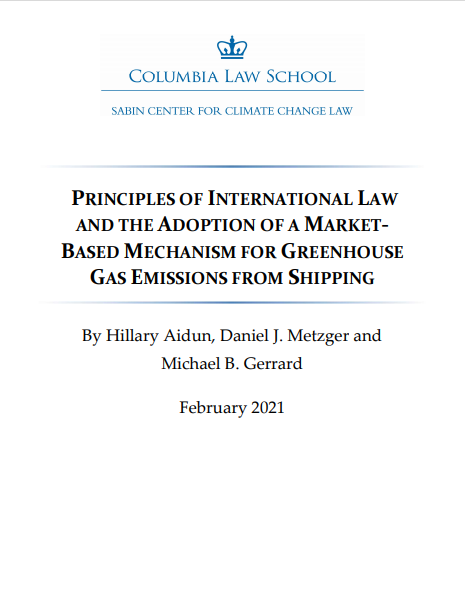

Central to any discussion of the Pacific’s transport decarbonization agenda is the question of the economics – what does the transition cost and how will it be funded and who will pay to implement? Our lack of in-country and in-region transport economists is alarming.
In the negotiations over transitioning international and domestic shipping, MCST has continued to play a leading role. We were the only SIDS voice at the Carbon Pricing Leadership Coalition after Paris. We have listened carefully and worked closely with economists from OECD-ITF, UNCTAD, World Bank and others.
At home our shipping companies and governments we have always struggled with the issues of inadequate and hugely expensive shipping finance and poor maritime insurance options. The Pacific Blue Shipping Partnership leads our investment call for $500m in our domestic shipping transition.
At IMO, we have led development of the most ambitious carbon pricing mechanism for any sector.
MCST has completed initial research of carbon pricing options under the IMO GHG emissions reduction Roadmap to provide guidance to Pacific high ambition delegations participating in these negotiations. This is the first such analysis undertaken through a Pacific lens.

Putting a price on shipping carbon emission is likely one of the most effective and contentious matters for IMO to now negotiate. There is lot at stake for Pacific States. Shipping emissions continue to grow and trend upwards. A 1.5oC agenda requires them to plateau now and sharply decline to zero before 2050. An ambitious carbon tax or levy can assist by a. reducing the price differential between fossil fuel and non-carbon alternatives, subsidizing in sector research and development (including specific research targeting the shipping needs of SIDS and LDCs), and b. providing compensation to the climate vulnerable from a punitive tax on the GHG pollution shipping causes.
The research recommends implementing an immediate levy of $250/tonne of fuel oil on all ship bunker, reviewed upward every 5 years. Such a tax could generate more than $60 billion p.a. with the majority for compensation via direct ship contributions to the Green Climate Fund and a lesser amount administered under IMO auspices for subsiding research, development and deployment of new technologies and fuel across the shipping sector.
Abstract
Market based measures and more specifically a tax on shipping Greenhouse Gas pollution from shipping has yet to be negotiated under the IMO Initial Strategy. This complex issue has previously not been considered through the lens of Pacific high ambition States or other climate most vulnerable nations. Available literature and expert opinion was canvassed and the international principles under which a decision to adopt a tax or not by IMO are discussed. The paper recommends Pacific delegations consider a measure where IMO adopts an immediate tax or levy under the principle of polluter pays with an initial entry price of $250/tonne fuel oil bunkered, with an upwards ratchet at five-yearly review intervals. Dispersement of the revenues generated is likely a highly contentious issue to be debated and it is recommended here that the majority revenue be allocated as compensation for loss and damage to the climate most vulnerable states and a minority to subside research, development and deployment in-sector. The impact of such a measure on Pacific island countries is discussed and a framework for considering any disproportionate impact on them proposed. There are deep equity and representation issues for Pacific SIDS, and most other climate vulnerable states, in the decision-making processes of IMO and our research indicates that such states will be disadvantaged and poorly represented in the forthcoming negotiations on financial instruments at IMO.
Available from: Ocean Yearbook 35
We have also worked with leading legal experts to understand the international legal and economic principles which must guide the Adoption of a Market-Based Mechanism for Greenhouse Gas Emissions from Shipping

When IMO negotiations break down, where do we turn to for guidance? In adopting the Initial Strategy on GHG emissions reduction in 2018, all IMO member states committed themselves to be guided in their decision-making by an agreed set of Guiding Principles. This new Columbia Law School White Paper examines these Principles as they stand at international law.
Achieving the Paris Agreement’s goal of limiting warming to “well below” 2°C above pre-industrial levels requires urgent and serious steps to reduce greenhouse gas. Shipping currently makes up nearly 3% of anthropogenic greenhouse gases (GHG) released worldwide, and those emissions are on track to increase. But the transnational nature of the industry makes it difficult for any state to address the issue alone, and little has been done at the international level to either force or incentivize shipping companies to decarbonize.
In a new white paper, published online, the Sabin Center examines nine principles of international law that establish and frame the International Maritime Organization’s (IMO) authority to adopt a market-based mechanism to reduce shipping emissions. The polluter pays principle provides strong support to adopt such a measure, which could require whoever causes emissions to cover the costs those emissions impose on others. And other principles of international law will work to ensure that any measure is sensitive the different contributions parties have made to climate change, views any uncertainties through the lens of the precautionary principle, and respects fundamental rights of all.
Prior Sabin Center white papers have explored The Legal Bases For IMO Climate Measures and the Authority of Pacific Island States to Regulate Greenhouse Gases from the International Shipping Sector. For more information about the Sabin Center’s publications visit our searchable library here.